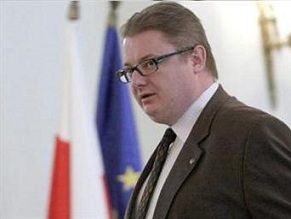|
World Jewish News

Polish MEP Michal Kaminski
|
Polish MEP brands EU appeals for monitoring of Israeli settlers violence ‘scandalous’ as forthcoming Irish presidency ramps up c
04.12.2012, Israel and the World Polish Conservative MEP Michal Tomasz Kaminski has called on EU foreign policy chief Catherine Ashton to take a firm stance on European Parliament calls for EU-led action on so-called “violent settlers”, as he insisted it was imperative that Israel should be allowed to deal with it as an “internal matter”.
Disputing the legitimacy of claims by the parliamentary Maghreb-Mashreq committee last month, which recommended the “possibilities of denying access of known violent settlers to the EU”, Kaminski appealed to Ashton in writing to verify “how would a person be defined as a ‘violent settler’ if he hasn’t been convicted?".
The classification of an individual as such, he contended, was a matter for Israeli authorities, who should equally be considered capable of taking “firm and decisive action to counter any forms of violence”, such as he insisted they have done to date.
Slamming the committee of MEPs’ suggestion of an EU monitoring mission in Jerusalem and Ramallah observing Israel’s response to settler violence, Kaminski raged: “It is scandalous that such an action (usually reserved for countries with gross human rights violations such as Belarus) is recommended toward a democracy like Israel which ardently upholds the rule of law.”
The point of contention comes after EU member states failed to reach a consensus position on the UNGA vote to upgrade Palestinian status in New York last week, with the majority of European UN members divided between favouring and abstaining from the vote.
Poland, a key ally of Israel, voted to abstain, as did Britain, which has subsequently criticised Israel for announcing a knee-jerk settlement expansion plan in the aftermath of the UNGA, which British Foreign Secretary William Hague claimed would “undermine Israel’s international reputation and create doubts about its stated commitment to achieving peace with the Palestinians”.
Ashton similarly slammed Israel’s plans to construct 3,000 homes in the E1 area near Jerusalem, reiterating the EU’s position “that all settlement construction is illegal under international law and constitutes an obstacle to peace”.
EU ambassadors attending a meeting of the Political and Security Committee in Brussels on November 16 meanwhile advocated a ban on settlement produce, alongside measures to deny violent settlers access to the EU.
Denmark’s foreign ministry, which has previously spoken in favour of a ban of settlement produce being labelled ‘Made in Israel’ also sponsored a closed-door meeting of Danish Christian nonproft organisation DanChurchiId which explored “possible practical actions” by EU states to “avoid inadvertently supporting the viability and growth of settlements”.
Meanwhile, forthcoming presidency holders of the EU Ireland reignited calls for a settlement produce ban, as Irish daily Irish Times reported a written appeal by Irish Congress of Trade Unions general secretary David Beg to Foreign Affairs Minister Eamon Gilmore calling for the minister “to seek an immediate and effective intervention by the Irish Government in light of the recent conflict in the Gaza Strip”.
A parallel appeal to Gilmore by a coalition of Palestinian agricultural and farming groups at the weekend similarly called for “a ban on trade with illegal Israeli settlements”.
The Palestinian farming groups say a ban on settlement imports “would apply meaningful pressure on Israel to comply with international law and end its gross infringements of the human rights of the Palestinian people.
“We urge the Irish Government to implement a ban on settlement trade as a first step towards advocating an EU-wide ban during the Irish presidency of the EU.”
A leaked letter from Gilmore last month, ahead of the start of Ireland’s §-month mandate in January 1, 2013, revealed the FM wrote to the chairman of the Irish parliament’ Joint Committee on Foreign Affairs and Trade to commit to following up the council’s controversial May conclusions which featured heavy criticism of Israeli settlement policy, with a “stronger response”, as he asserted a ban on settlement products would be “consistent with EU values”.
Despite contending there was “a moral case for banning settlement products”, he admitted that such a course of action would do little to slow the “relentless expansion” of Israeli settlements, as he concluded that settlement produce constitute “a small fraction of imports to the EU from Israel”.
The communication, dated November 2, was issued following last month’s two-day visit to Dublin by European Parliament President Martin Schulz, where he praised the Republic for displaying “strong European commitment” and its people for being “great Europeans”.
Despite being sceptical of there being any “prospect, at this point, of reaching agreement on a ban at EU level”, however, Gilmore has not advocated introducing such measures at national government level, insisting only a comprehensive EU ban at international level would be effective in making a symbolic protest at Israel’ continued settlement expansion policy.
EJP
|
|
